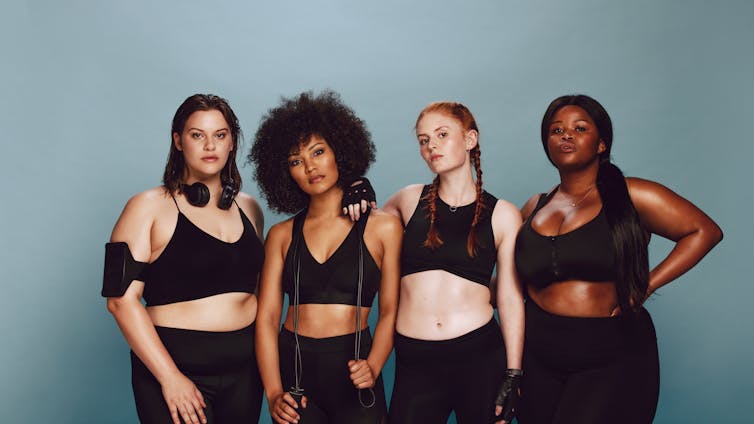The Black Lives Matter movement, and the renewed focus on equality and social justice for black people that has come with it, has brought increasing attention to the issue of colourism. This form of prejudice privileges people of colour with lighter skin and discriminates against those with darker skin.
Prominent black public figures, including the British singers Alexandra Burke and Beverley Knight, have begun to share their experiences. In June 2020, Burke spoke of how people in the music industry had told her to bleach her skin in order to succeed. That same year, Knight told ITV News that the music industry is keen “to market people who are perhaps a little lighter than I am because it’s seen as being more mass accepted”.
Few black men, however, have spoken out. Little research has been done on men’s experiences of colourism, and none, to our knowledge, in the UK specifically. To address this gap, for a recent study we conducted in-depth interviews with nine men (eight of whom identified as black and one as mixed race) from January to July 2019.
We found that despite having been subjected to colourism, some men also perpetuate it. It impacts both their confidence in themselves and their ideas of who is attractive.
Internalised hurt
In our study, black and mixed-race men’s experiences of colourism seemed to be most pronounced during childhood and adolescence. It occurred within families at home and among peers at school. As a result, some of the men we spoke to had internalised negative ideas about darker skin shades, with lasting effects on self-confidence.
Terrence, 22, said that his oldest brother was lighter than him and “always used to make jokes” about their other brother’s dark skin. He said:
It would never be directed at me, but I just knew that I was darker than him. You’re left wondering if what you look like is the ideal.
The impact of his brother’s colourism was exacerbated by the jokes he was subjected to at school. Classmates would comment on both his skin shade and that of others with equally dark skin.
“It never really struck me deeply,” he said, “but sometimes you just look in the mirror and you’re like, ‘Wow, I am dark.’” He said that growing up, you just kind of internalise that idea that “lighter is brighter, lighter is better”.
This echoes studies among black Americans and among Pakistani women that show a negative correlation between internalised colourism and self-esteem. This underlines the global nature of the prejudice.
Status symbol
We found that being subjected to colourism did not necessarily stop men from perpetuating it. One man, Isaiah, said that when he was younger, he treated people who were dark differently. “I treated them less than … I treated them not as nice.”
What Isaiah is describing is internalised colourism, which is akin to internalised racism. Due to the structural nature of racism, people of colour can perpetuate the prejudice to which they, themselves, are subjected. As Australian sociologist Adam Seet has put it, they are in effect indoctrinated into holding racist beliefs about themselves and the group to which they belong.
So too with colourism. The men we spoke to said that being seen to have relationships with mixed-race women or black women with light skin conferred status on black men. As another man, Bilal, put it:
With a lot of black men, you haven’t really made it or you’re not really successful until you have obtained a light-skinned or fair-complexioned woman … As a young boy growing up in London, if you’re with a pretty light-skin or mixed-race girl, you’ll get a slap on the back from your peers and people will be like, you’ve done well and you’ll feel a sense of accomplishment.
In 2017, British journalists Kimberly McIntosh and Sophia Leonie responded to a viral video in which young black men had described how they preferred girls with light skin. For McIntosh, these boys were “reciting from the colonial scripture – beauty is measured in its inches from whiteness”.
This has harmful consequences. Research in the US has shown how colourism leads to black women feeling less desired. As McIntosh put it, “If young black women internalise racialised beauty standards, it can spawn a debilitating self-hatred. Blocking out the messages of the fashion and cosmetic industries is hard enough. Being spurned by your own race is another burden dark-skinned black women just don’t need.”

Jacob Lund | Shutterstock
Pride and authenticity
The men we spoke with highlighted the many privileges associated with light skin and, conversely, the prejudices against dark skin they themselves and others have experienced. Some, however, also argued that dark skin symbolised black authenticity.
For these interviewees, black skin was a source of pride. This fits with Black antiracist aesthetics that celebrate natural hair, dark skin and African features. One interviewee, Ekow, said that in Ghanaian culture, the darker a person is, the more spiritual they are perceived to be. “I like my skin shade,” he said. “I love it.”
Different characteristics including skin shade, ethnicity and gender intersect and collectively affect a person’s experiences. Understanding how people of colour, and black and mixed-race men in particular, experience and perpetuate colourism – in all its complexity – is central to challenging it.
Black Lives Matter activists have been working to disrupt racist structures. The narratives about the value of dark skin from some of our participants point to efforts to address colourism, which need to go hand in hand with efforts to address racism.
![]()
The authors do not work for, consult, own shares in or receive funding from any company or organisation that would benefit from this article, and have disclosed no relevant affiliations beyond their academic appointment.











